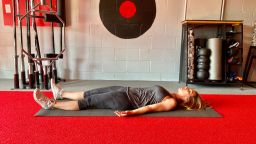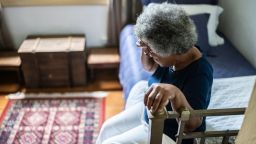Sign up for CNN’s Stress, But Less newsletter. Our six-part mindfulness guide will inform and inspire you to reduce stress while learning how to harness it.
In an age when technology allows for easy communication between people far and wide, why do so many of us feel so disconnected?
Teacher, author and international facilitator Thomas Hübl sees this growing pattern of personal isolation, alienation and division on a global scale as the “manifestation of collective trauma.”

So ubiquitous and insidious are the effects of this trauma, he writes in his forthcoming book, “Attuned: Practicing Interdependence to Heal Our Trauma — and Our World,” that “we have come to consider it ‘normal.’ This is just how things are. Just how families are. Just how people are. Just how the world is.”
To face our world’s complex challenges, we need to address that trauma and heal, Hübl argues. Those challenges, including mounting political authoritarianism and political, racial, ethnic, religious and sectarian conflict, demand a new level of human collaboration.
Recognizing that “nearly everything in the human story depends on the quality of our connections to one another,” he invites each of us to process our trauma to restore balance and foster healing. That’s how we will “bring our share of light to a struggling world.”
This conversation has been edited and condensed for clarity. A meditation is below.
CNN: How could the trauma of our ancestors exist within us today?
Thomas Hübl: So often in the West we see our existence as hyper-individualized and separate, but we are part of the many generations that precede us. Despite the age that’s written on our passports, our bodies are built of hundreds of thousands of years of living, with all our ancestors adding something to our being now. All their achievements sit within us: rational thinking, emotional complexity, physical function, self-healing and more. Some of this is simply intergenerational learning that helps us recognize dangers in the world. But trauma that hasn’t been integrated can get passed down as hypervigilance, stress and maladaptive fear.
CNN: Where does trauma get stored in our bodies?
Hübl: First off, trauma often gets conflated with adversity itself, but it’s actually how our nervous system responds to a distressing experience. This response has an intelligent, protective function. Our nervous system is trying to keep us safe. But if we don’t learn to integrate trauma, the symptoms can sometimes lead to severe side effects.

We’ve long recognized that going through war or difficult circumstances affects later generations. Now we can see this scientifically through epigenetics, which shows how DNA can get activated differently based on lived experiences. Research on mice, for example, has shown that mice who’ve been traumatized pass on symptoms to their offspring for five or six generations.
We are finding out more about how epigenetic transmission increases fear and stress receptors, which literally live in our bodies.
CNN: What signs suggest that ancestral trauma could be affecting you?
Hübl: Trauma often gets expressed as exaggerated reactivity. This can include aggression and lashing out at those we blame as the source for our discomfort. Another symptom can be numbness, which leads to withdrawal and detachment from others. We become indifferent and disconnected.
When we go through an overwhelming experience that the nervous system cannot process, we lose our relationship to life in that moment. Our stress level shoots up, leading to strong fight or flight reactions. Further stress can lead our nervous system to shut down and seal off parts of awareness, like sealing off the damaged part of a ship where the water’s coming in.
The nervous system shutdown acts like anesthesia. We feel our body less. If we don’t learn how to turn off that anesthesia, we walk around for the rest of our lives less aware of our bodies and what is or isn’t healthy for us. These reactions can get frozen into our nervous system so that triggering circumstances stir up trauma responses.
If we notice these symptoms in ourselves, then most likely we carry trauma from events in our own lives, or we have the aftereffects of our ancestors’ trauma.
CNN: How can we tell if the symptoms we’re experiencing come from our own lives or that of our ancestors?
Hübl: More important than trying to figure out whose trauma we’re experiencing is to develop curiosity about our triggers. Instead of creating stories, attributing our experiences to this or that situation, it’s best if we connect to our bodies. Start by noticing: OK, I feel a heightened level of stress. Then try to connect with the stress you feel, identifying where it resides in your body.
Developing better body awareness in non-stress moments first can help. For many of us, our body is like an amazing car, but we never read the manual. In good moments, ask yourself, where does my body feel pleasant? Spending two to five minutes doing this regularly can help us get to know the body better.
This practice can show us where our body is most resourced, grounded and open. Identifying these areas can help when I have a trigger moment because connecting first to those areas of my body that usually feel pleasant can help me get grounded. Then, by slowing my breathing, I can decrease the stress. It’s not always comfortable, but I learn how to be consciously present with my stress. This process helps me to down-regulate my nervous system to relax further.
After a few months of practice, the relaxation process that might have taken five minutes before can now take maybe 15 seconds because I developed a muscle I can use consciously. This practice helps me regulate functions of my nervous system that I might not have used before because I wasn’t even aware of it.
CNN: When many people think of trauma, they usually think of emotional symptoms. How do those tie into your healing approach?
Hübl: I believe all mental health issues are ingrained in the body. Many people get frustrated when trying to treat trauma through mental reflection in talk therapy. That’s because trauma exists beyond the narrative. In the best case, the narrative is just the entry gate into the emotional, physical and sometimes ancestral experience. We need to solve these things through our bodies.
CNN: What does trauma healing entail?
Hübl: A lot of trauma healing happens best in connection with others — especially those trained in staying attuned to the physical, emotional, mental and relational experiences of themselves and others through practicing whole-body listening. This is because the hurt often stems from inappropriate relations, such as violence, abuse or neglect.
Those of us who do trauma integration work have learned to train our nervous systems to attune to the hurt part of another person. A facilitator therapist can create for the traumatized individual the connection that was missing when the trauma occurred, meeting clients with exactly what they needed back then. Providing the supportive relational environment that was missing at the time can help free up the hurt parts of them that have, through trauma, become frozen in time.
CNN: What impact does trauma have on society at large?
Hübl: Look at how politicians yell at each other. That’s not normal. That’s hurt. Polarization, racism, inequality — these are not normal. This is a hurt world.
When we are in a healthy relational flow, I can feel you, and I can feel how you feel me. But when I’m hurt, I can’t feel you, and I also don’t feel if you feel me. That disconnect touches the trauma that can lead us to overreact. This sense of separation can escalate to exclusion — the notion that there are whole groups of people who are just completely wrong who I don’t want to engage with.
“Othering” people creates serious social issues. We cannot solve anything if we’re so strongly polarized. This tendency in society is itself a strong collective trauma symptom. When we look a little deeper at how exactly we’re experiencing the person we see as other, we often find that we’re actually scared.
CNN: How can we better connect with those around us?
Hübl: Too often we try to avoid difficult interactions or situations. But, in the long run, difficult moments are our teachers. There’s always something to learn. One helpful practice is to become curious about difficult situations.
Rather than projecting blame onto others, explore the experience we’re having with them. That’s where real potential for change lies. I may not be able to change another person, but I can change my relationship to them. With practice, by doing my own inner work, I can become freer and more fluid, with more options for how I might respond.
CNN: What practices can help us heal?
Hübl: Throughout the day, whenever I have a moment between meetings and other commitments, I take a breath and grant myself a quick check-in with my body to gauge my current state of stress. This helps me train my nervous system to strengthen pathways for self-awareness, creating an inner mindfulness.
I practice this same curious investigation when I engage with others, exploring the sense of “I feel you and I feel how you feel me.” Sometimes it’s easier for me to feel the other person. When it’s harder, I don’t judge myself that I’m a failure. I just make it a practice to strengthen the muscle of awareness that creates relational safety, trust and a mutual space of understanding.
The other thing I recommend is to take notes every time you encounter a difficult situation, say, if you had a difficult conversation with your boss or something happened with a client. In the evening, take five minutes to reflect on the question: What were my difficulties today? Replay them a little bit, not just by thinking but by listening to how you felt in your body when that happened.
Allowing your nervous system to digest that trigger moment, bringing more awareness to it, can lead to insights that help us use our triggers as teachers rather than simply trying to avoid them and recreating the same difficulties day after day.
We are living in a time of astonishing upheaval and unimaginable promise. Engagement of even a small number of us in collective healing can create the critical mass needed to enact real change.
Jessica DuLong is a Brooklyn, New York-based journalist, book collaborator, writing coach and the author of “Saved at the Seawall: Stories From the September 11 Boat Lift” and “My River Chronicles: Rediscovering the Work That Built America.”









